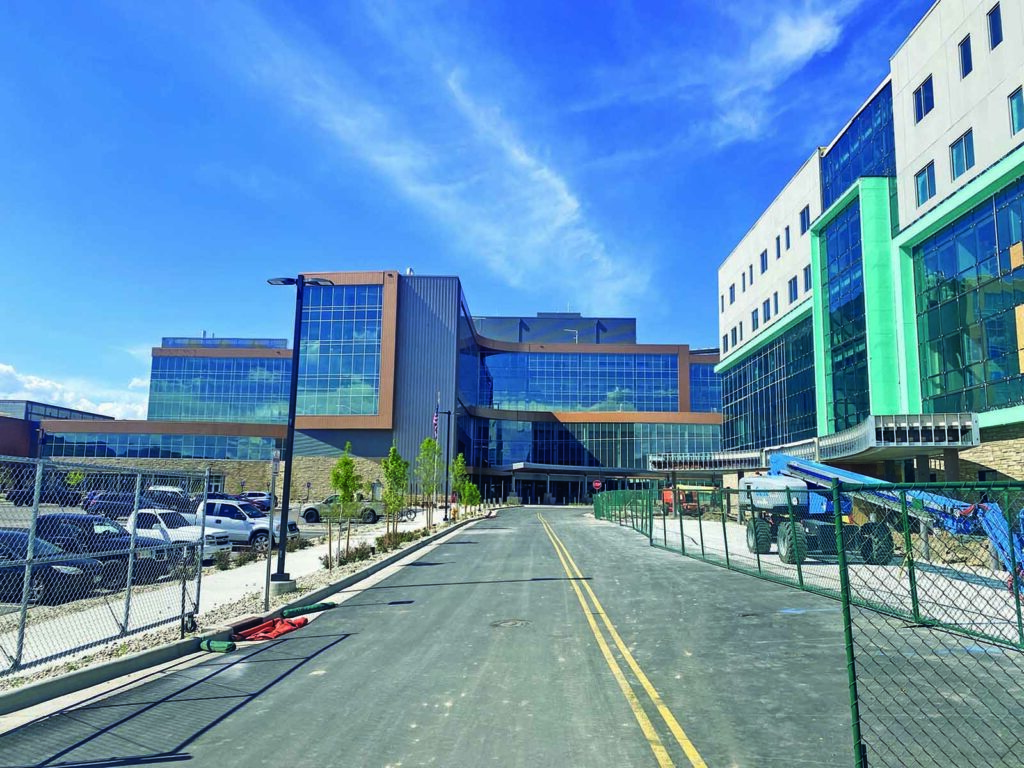A zoning change to help the current Lutheran Medical Center site be redeveloped will be pursued this year, while a city charter amendment regarding building height on the property may be put before Wheat Ridge voters in the Nov. 5 general election.
On May 13, the city council unanimously approved a rezoning process. They also directed a public education effort regarding the zoning and an amendment to take place this spring and summer before deciding to place it before voters. Both matters were brought to the forefront because of Lutheran’s impending move to a new location in northwest Wheat Ridge.
Lutheran has operated at its 100-acre Lutheran Legacy Campus onv38th Avenue since 1961. In 2018, SCL Health (the previous medical center owner) purchased a 26-acre parcel at Clear Creek Crossing, west of Interstate 70 at 40th Avenue, for a new medical center.
Community Development Director Lauren Mikulak noted the city had already received questions about building heights on the Lutheran property. She said both the zoning and charter amendments would address height restriction issues.
“Right now, we can say it won’t be any higher than the current medical center,” Mikulak added.
One neighbor of the current medical center, Rose Marie Bowden, lives in a 1932 building that was once part of the hospital administration. She is worried taller buildings would compromise her comfort and privacy.
“Do I really want someone looking down on my house and seeing everything we do?” Bowden said. “We don’t want to lose our privacy, but it will probably turn into something like St. Anthony’s [Hospital in Lakewood.]”
After that hospital was built, the area around it saw commercial and residential development.
“It just makes me cry to think of that,” Bowden added.
Another nearby resident, Candace Tomlinson, told the council on April 8 that many people “think it will be all high-rise apartment buildings.” She encouraged the education effort.
“You’ll avoid a lot of anger and frustration with people thinking the city is just ramming this down their throats and they had no input,” Tomlinson said.
Poll results encourage city council
Magellan Strategies, the city’s polling consultants, polled more than 1,000 voters between April 30 and May 9 regarding a 2021 master plan for the site and potential charter amendment.
While 85% said they knew about Lutheran’s relocation, only 7% said they were very familiar with the master plan. A quarter of the respondents said they were not at all familiar with the plan.
Originally, 42% said they would likely vote for a charter amendment, 48% said they would oppose it. However, after they were given more information, 64% said they would likely favor an amendment.
“Anything over 60% is good,” said Ryan Winger, Magellan’s polling project manager and director of campaign strategy.
Councilwoman Janeece Hoppe said while the results “are quite positive news for us, it definitely shows there is some education needed.”
Councilwoman Leah Dozeman agreed.
“I think we can plan on a pretty robust opposition campaign,” Dozeman stated.
“I’m not too encouraged by the results, but they do show that a little bit of education can go a long way,” said Councilwoman Rachel Hultin.
Hoppe said waiting two years for the next general election to seek approval of a charter amendment is not a good option.
“We could end up with a project in the interim that we may not like to see on that site,” she explained.
City Manager Patrick Goff said the site may sit empty for some time if the city does not seek a charter amendment this year. City staff had met with interested developers who said they would likely need a 5-to-6-story building, he added.
Mayor Pro Tem Korey Stites noted the city’s 2026 election will include races for mayor and some city council seats, and posing the height restriction question on the same ballot might influence how residents vote.
“It would be entirely based on Lutheran and I don’t think that’s something we want to do,” Stites said.
Master plan leads to new zoning
A master plan outlines the community’s vision for development at the current site. However, the plan does not identify specific uses or site plans, Mikulak wrote in an April 8 memo to the council. Instead, it describes three key trade-offs associated with redevelopment:
- The perimeter should serve as a buffer and transition between the campus and adjacent neighborhoods;
- Redevelopment should try to integrate existing assets such as the chapel, blue house and Rocky Mountain Ditch trail, and;
- The interior would allow more land use options and set building heights.
The current medical center is estimated to be more than 100 feet tall and is a legal nonconforming use, Mikulak wrote. But the city charter limits new development to 35 feet for residential uses and 50 feet for non-residential uses.
In 2009, voters approved charter height and density cap exemptions for areas along Wadsworth Boulevard, Kipling Street, the transit area and Clear Creek Crossing, Mikulak added.
In a May 13 memo, Mikulak stated city-initiated rezonings, such as the proposed Lutheran site, may be made “with or without consent from affected property owners and … to any zone district.”
Similar to a private rezone request, a neighborhood meeting, planning commission and city council public hearings are required, she noted.
A proposed zone change would have the same boundary as the master plan, eliminate current restrictions and align with the plan, Mikulak wrote. It would allow a mix of residential, office, civic, retail, cultural and various housing types. It would also require open space and multi-modal transportation.
A city-initiated zone change is a faster process than a private zone change, Mikulak added, would reduce how long portions of the property sit vacant and help encourage investment in the site.
The zoning proposal will be part of June 6 and Sept. 17 city open houses. Other education efforts will include print, social media and public events throughout the year.






